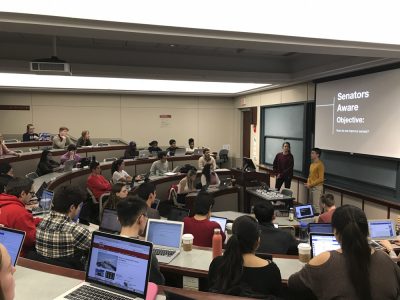
The Boston University Student Government created a new Senate committee and voted on a recommendation to restructure Allocations Board funding at its meeting Monday night.
Senators heard a proposal from Brigitta Call and Adrian Lee, both sophomore senators in the College of General Studies, who were seeking to create an ad-hoc committee called “Senators Aware.” Lee said the purpose of the committee was to improve the day-to-day operations of SG.
Call and Lee’s committee would limit discussion time for new proposals in an effort to allow more proposals to be addressed in each meeting. Lee said SG has only passed 23 proposals in the last year.
Senators raised concerns that the proposed committee was too similar to the already existing Rules Committee, which regulates how Senate functions. Call and Lee said Senators Aware would be more lenient than the Rules Committee and would change the responsibilities of the Rules Committee.
Arthan Bhatt, a freshman senator in the College of Engineering, said he thinks the Senators Aware committee will be important as Senate moves forward.
“Overall [Senate has] a structural problem — a motivational problem,” Bhatt said. “Having a committee there to keep people in check or to make sure that we’re holding people accountable, I do think is a good idea.”
Sarah Stewart, director of finance for SG, introduced a representative from the Student Activities Office to discuss changes to be made to SAO’s Allocations Board. The conversation about the role of the Allocations Board began in last Monday’s meeting.
Madison Cannon, SAO’s assistant director of student organizations, told senators at the meeting that SAO is revising the current system to better serve the student community.
“The way the policies have currently been written is that way fewer groups get funding [despite] a much larger [pool] of money. So, it’s not really fair in the grand scheme of things,” Cannon said. “We used to have requests from more than 200 groups and now we have just over 100, so we’ve cut the population that we’re funding in half.”
Senators voted 26 to five to adopt a recommendation that would restructure the Allocations Board. This will cap the budget for entire categories of student groups but allow groups to use the funds at their own discretion. Previously, expenses such as travel and food were not funded by the Allocations Board.
Elliot Snow, a College of Arts and Sciences freshman senator, said the debate over restructuring the Allocations Board was an important step for SG.
“The main takeaway is that AB is looking to collaborate with SG more, and I think that’s really the promising future,” Snow said.
CAS Senator Andrew Chiao and ENG Senators Nehemiah Dureus and Aditya Jain presented an amendment to the SG Constitution called the “Caucus to Authorize Provisions” (CAP). The amendment aims to improve transparency between Cabinet and Senate by requiring all Cabinet funding over $2,000 or 5 percent of SG’s budget to be approved by senators.
Vincent D’Amato, a freshman senator from the Sargent College of Health and Rehabilitation Sciences, said transparency between Senate and Cabinet is important.
“[The amendment] will show us more of how Cabinet’s using the money,” D’Amato said. “It could make sure they’re being efficient with their spending.”
Senate Chair Octavio Vidal said he thinks the amendment can be dangerous when responsibilities are taken away from a certain group.
“Instead of checks and balances it could be seen as sort of a transferring of power, of responsibilities,” Vidal said.
Senators will further discuss the amendment at the next meeting and vote on it in a subsequent meeting.
The final presentation of the night came from Michael Meagher, a sophomore CAS senator and the chair of the Rules Committee. Meagher presented a number of proposed changes to the SG Constitution, including cutting defunct committees and streamlining rules for impeachment.
“Part of what I’m trying to do is to make the Constitution work better,” Meagher said. “I want the Constitution to reflect how Student Government actually works. I want it to be simpler. I want it to be easy to understand and I want it to be not obsolete.”
The proposed changes will be debated on at the next SG meeting and voted on the meeting after.
Shaun Robinson contributed to the reporting for this article.














